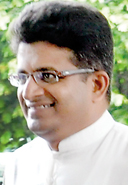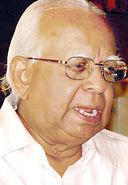Indo-Lanka ties near breaking point; Moves to repeal 13th Amendment
By Our Political Editor
R Sampanthan-------------------------------------------Udaya Gammanpila, Deputy Leader of the Jathika Hela Urumaya (JHU)
A deal brokered by India for the Tamil National Alliance (TNA) to engage in a dual track dialogue with the government, revealed exclusively in the Sunday Times of October 7, has run into serious problems.
One such track was to be the resumption of the bilateral talks between the Government and the TNA. The other was TNA’s participation in the proposed Parliamentary Select Committee (PSC). In a dramatic turn of events, the TNA will not make any statement declaring its willingness.
Nor will the government of India stand guarantor for what would have been the outcome of its own new attempt at rapprochement. Initiatives have broken down within weeks after they began.
This has spawned some unexpected realities. Main among them is a firm polarisation of views between the Indian and TNA leaders who visited New Delhi last week. This is on common issues related to Sri Lanka. More importantly, it has placed a greater strain on the already overstrained ties between Sri Lanka and India. Some diplomats, both Sri Lankan and Indian, fear the levels of strain are unprecedented and warn that coming events could further exacerbate the situation. They do not hide the fact that New Delhi is incensed over recent political developments in Sri Lanka.
No sooner had the TNA members returned to Colombo, they were invited by China’s Ambassador Wu Jianghao for a meeting. Even China, which is pumping in millions of dollars for development activity in Sri Lanka, remained aloof in the past. Now, it seems to have a keener and more overt interest in political developments in this country. A TNA delegation briefed the Chinese envoy on its visit to New Delhi, the on-going stalemate over the talks and even discussed Sri Lanka-China relations. According to one TNA delegation member, there were searching questions from the Chinese about their dialogue so far with the government.
The recent short-lived Indian initiative had its origin in a meeting between President Mahinda Rajapaksa and Prime Minister Manmohan Singh in New Delhi last month.
The recent short-lived Indian initiative had its origin in a meeting between President Mahinda Rajapaksa and Prime Minister Manmohan Singh in New Delhi last month.
That visit itself was the subject of an involved diplomatic process. At first, Rajapaksa was invited to the Central Indian state of Madhya Pradesh by its Chief Minister Shivraj Singh. It was to lay the foundation stone for a University of Buddhist and Indic Studies in Sanchi. The central government in New Delhi had sought to only facilitate the visit and ensure the strictest security arrangements were in place. These security arrangements included almost door-to-door plainclothesmen and armed police and helicopter cover in the air.
A diplomatic question had arisen after Rajapaksa, through official channels, had expressed a wish to meet the newly elected Indian President, Pranab Mukherjee, whom he regards as a personal friend. He had wanted to congratulate him on his election to the high office. Both Rajapaksa and Mukherjee have been talking on the telephone on occasions when there was a spike in tensions between the two countries. Mukherjee, then Finance Minister and one-time External Affairs Minister in the Congress-led government, had used his good offices to present the Rajapaksa administration’s point of view.
Does he go to New Delhi in his personal capacity with no official engagements or invitations from the centre? How would he be received in New Delhi with all courtesies without an official invitation? These were among many questions that confronted both Sri Lankan and Indian officials. The issue was overcome with the Indian government extending an invitation, declaring the visit official and laying out the red carpet.
That was how Indian Premier Singh held talks with Rajapaksa on September 20 and later hosted him to a lavish banquet. During those talks Premier Singh had touched on a number of issues. They included matters relating to the anti-Sri Lanka campaign in Tamil Nadu, the Colombo government’s travel advisory warning Sri Lankans against visiting the southern Indian state (since withdrawn), the need to resume talks to evolve an acceptable political package to address Tamil issues where they could live with “self-respect and dignity” and elections in the Northern Province. Singh is learnt to have said there was a perception that the Sri Lanka government was going back on assurances it had given New Delhi.
Rajapaksa was to strongly counter some of the issues raised by Singh. He said that elections to the Eastern Provincial Councils had already been held. He had announced that elections to the Northern Provincial Council would be held before September next year. The Government was willing to resume talks with the TNA as soon as it expressed willing to serve in the proposed PSC. The only delay, he had pointed out, was on the part of the TNA. Thus emerged the broad parameters of an Indian initiative to persuade the TNA to resume both bilateral talks with the Government and at the same time serve in the PSC. India was to talk to TNA and try to persuade it to go to the negotiating table again.
“We were invited to India by their External Affairs Ministry. This was consequent to President Rajapaksa’s visit to India and talks with Premier Manmohan Singh,” TNA leader Rajavarothayam Sampanthan told the Sunday Times. He said the TNA delegation told the Indian Premier, “it is not our assessment that the Sri Lanka Government is genuinely committed to a reasonable settlement.” He said Premier Singh “seemed to appreciate our position”. Hence, Sampanthan added that no pressure was brought on his alliance. Sampanthan was to brief the Indian Prime Minister on a number of issues. He had complained that displaced people were now located in “half way homes”. He had alleged there was “military interference in civil administration” and there were problems related to the livelihood of those in the North.�(See story for questions answered by Sampanthan.)
Even whilst the high profile visit to India by TNA continued, the government in New Delhi appears to have been concerned over political developments in Sri Lanka. There were several thorny issues that were hurting the bilateral relationship more than before. One of them was the controversial Divineguma Bill, which India believes, takes away subjects now under the Provincial Councils (PCs). These powers were vested with the PCs in terms of the 13th Amendment to the Constitution. This amendment became part of Sri Lanka’s Constitution after India played a key facilitator role. It came in the years that followed the ethnic violence in July 1983.


